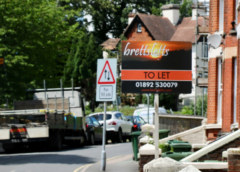Fixed-rate mortgage deals have gotten cheaper in recent weeks – but will this trend continue following the Bank of England’s decision to hold the base rate at 5%? We’ve spoken to five mortgage brokers to see what they think is next for mortgage rates.
Read MoreAuthor: interestratesinfo
Mortgages at six times’ income for first-time buyers
Mortgage lenders’ attempts to lure in first-time buyers have stepped up with the UK’s biggest building society allowing some to borrow more.
The Nationwide said that from Tuesday, new borrowers could request a mortgage up to six times their income with a 5% deposit.
Read MoreGeneration Rent back on warpath demanding Labour rent controls
The leader of tenant activist group Generation Rent has renewed calls for the Labour government to introduce rent controls.
Read MoreFirst-time buyers face a decade of saving for a deposit
The average first-time buyer would have to save half of their earnings for almost a decade to afford a deposit, new analysis by the Home Builders Federation (HBF) has revealed.
Read More‘I’m Selling 35 Homes’: Landlords Struggling, but Public Says ‘Good Riddance’
It’s a tough time for landlords, with new legislations, CGT tax rises, incorporation challenges, EPC requirements, The Renters Rights Bill and mounting financial pressures, there’s no surprise that many landlords are looking to sell.
Read MoreSurge in mortgage borrowers aged 70 and over
Nearly £2 billion in mortgages were taken out by borrowers over 70 in the year to April, according to a study of Financial Conduct Authority data by TWM Solicitors.
Read MoreLandlord fined £5,000 after failing to get HMO licence
A landlord in Colchester has been handed a £5,000 civil penalty notice for failing to license his unsafe HMO.
Following a complaint made one of the tenants, the council’s private sector housing team discovered that a family of four and two unrelated men were living in a four-bedroom flat.
Read MoreIs Buy-To-Let Still Worth It?
Higher borrowing costs, a reduction in tax relief on additional homes, plus more stringent requirements for landlords under the new Renters’ Rights Bill, are combining to take much of the shine off buy-to-let as an investment.
Read MoreLenders cut mortgage costs despite Bank decision to freeze base rate
Mortgage lenders are cutting rates despite the Bank of England decision yesterday to hold the base interest rate at 5%.
The Bank’s Monetary Policy Committee voted by a majority of 8–1 to maintain the rate at 5% after making a cut of 0.25% last month.
Read MoreMortgage rates: When will UK interest rates fall again?
The Bank of England has kept interest rates on hold at 5%, but a further cut is expected later in the year.
Interest rates affect the mortgage, credit card and savings rates for millions of people across the UK.
The first drop in rates for more than four years came in August, but borrowing costs remain high.
Read More








